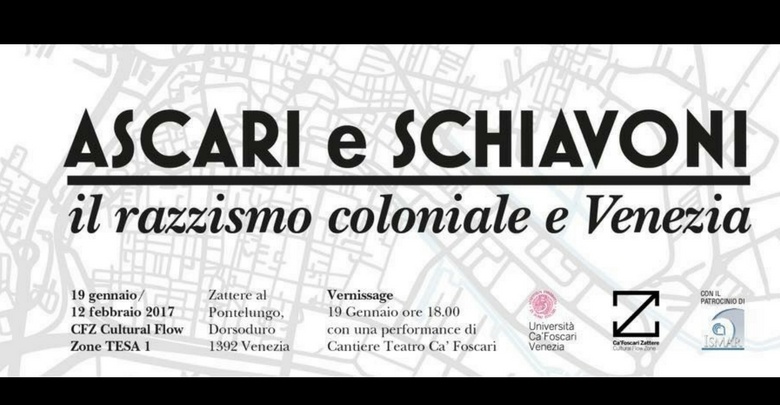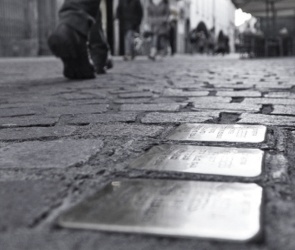
Ascari e Schiavoni. Il razzismo coloniale e Venezia (Ascari and Schiavoni: Colonial Racism and Venice)
“Ascari e Schiavoni, il razzismo coloniale e Venezia” nasce con l’intento di aprire uno spazio di riflessione, di ricerca e di dialogo in occasione di una scomoda ricorrenza: l’ottantesimo anniversario della prima legge sulla «tutela della razza», varata per impedire rapporti «d’indole coniugale» tra uomini italiani e donne africane.
“Ascari e Schiavoni, il razzismo coloniale e Venezia” (Ascari and Schiavoni: Colonial Racism and Venice) is an exhibition organized at Ca’ Foscari University of Venice which aims at provoking a discussion about the 80th anniversary of the first Italian law intended to “preserve the purity of the Italian race” (1937).
This law was meant to forbid Italian men from having “marriage-like” relationships with African women and was the first step towards a long series of legally acknowledged racial discriminations. This is an opportunity for people to discuss about the racism that fuelled Italian colonialism and to present new research that can shed light on these events and on how they are directly linked to Italy in our present days.
The project was born out of a collaboration among students with different interests and backgrounds, as part of the commemorations for the “Day of Holocaust Remembrance” (27 January), and it is intended to focus on the historical circumstances of the racist turn that led Europe to the tragedy of the Shoah. We conducted research in local archives and institutions meant to preserve documents of the Italian past, and we found books, newspapers, photos, drawings and oral testimonies from and about this period.
The exhibition reconstructs the main events concerning Italian colonial racism, and shows how the Italian experience was no less violent than that involving other countries more frequently associated with colonialism. We intend to contrast the typical Italian way of absolving ourselves of our war crimes through the unfortunate myth of «Italiani, brava gente» (“good fellas Italians”). This myth represents Italians as a good people by nature, and suggests that no bad things could have happened whenever Italians were involved. In order to do so, we brought together the different points of view of the University faculty, of Venice and its suburbs, and of the younger generation.
The idea of Venice as our central focus led us to the controversial choice of using Ascari and Schiavoni for the title of this exhibition. Historically speaking, Ascari were African paid soldiers serving under the Italian colonial empire, while Schiavoni were Slavic foot soldiers of the Serenissima Venetian Republic (IX-XVIII centuries). The names of these two kind of soldiers continued to be used to name places and roads and in the popular vernacular with a derogatory meaning. Eventually, the precise memory of those who initially held that name was lost, along with the colonial and racial background that generated them, even though the contempt associated with those expressions did not always disappear. We consider these designations highly indicative of the process of removal which Italy has experienced in relation to its colonial past. The names in the title of the exhibition also make easily recognizable the two main areas involved in Italian colonialism: Africa and the Balkan peninsula.
| пн | вт | ср | чт | пт | сб | вс |
|---|---|---|---|---|---|---|
|
1 |
2 |
3 |
4 |
5 |
6 |
7 |
|
8 |
9 |
10 |
11 |
12 |
13 |
14 |
|
15 |
16 |
17 |
18 |
19 |
20 |
21 |
|
22 |
23 |
24 |
25 |
26 |
27 |
28 |
|
29 |
30 |
|
|
|
|
|
CFZ – Cultural Flow Zone Tesa 1 from January 19 to February 12 2017
Zattere al Pontelungo, Dorsoduro 1392, 30123 Venezia
ph: +39 041 234 5811 / 5820
ascari.e.schiavoni@unive.it
from Monday to Saturday from 10 am to 7 pm
Sunday from 3 pm to 7 pm
